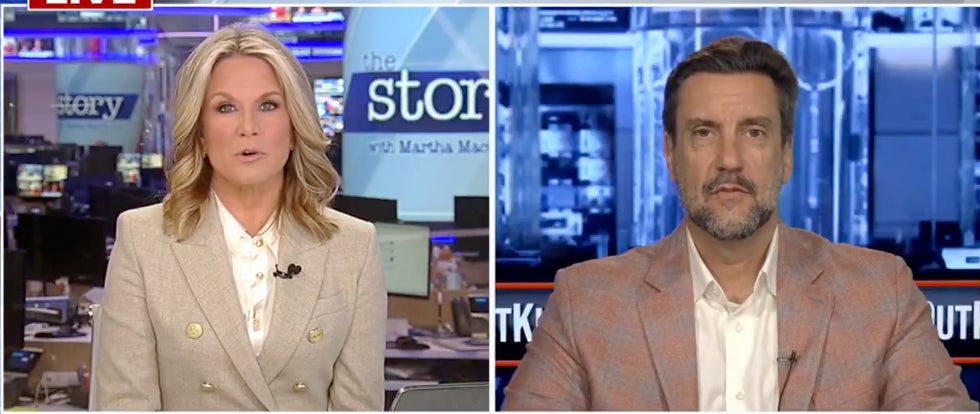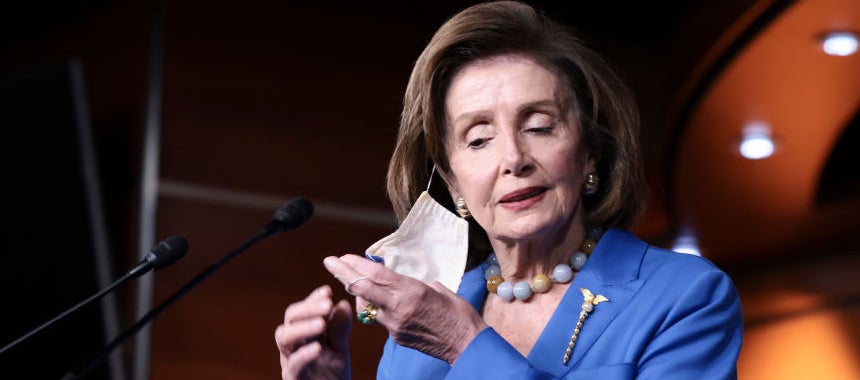Why Pelosi Wants the IRS to Track Your Bank Account
12 Oct 2021
CLAY: Now, Buck, we got Nancy Pelosi, this monster bill that is out there with the IRS looking into every bank account. I don’t think this is getting enough attention. You and I talked about it some last week. There is a proposition here that would allow the government to look at every transaction of $600 or more inside of your bank account, in an effort to determine whether or not you might be skipping out on your obligations from a tax perspective.
BUCK: Pelosi was asked about this today. Let’s remember, just so everyone understands, yes, obviously the government — and I’ve actually written up some of these warrants. I know how this stuff goes. The government can see your financial information if it subpoenas it, right? But there are some requirements for anything over $10,000.
There’s also these requirements about structuring, where if you have cash that they say you’re trying to evade requirements by staying under $10,000 and you’re having cash withdrawals all the time or deposits, it’s actually a criminal offense, believe it or not.
So there are some of these weird rules. Six-hundred dollars is something that you would think wouldn’t be of a high enough government priority that they would want to just access because in the normal course of business, the IRS wants to see what you’re up to. Nancy Pelosi made it clear today that she disagrees.
REPORTER: One of the pay-fors in the Build Back Better bill that’s been proposed is IRS cracking down on some unpaid taxes. Banks are starting to get calls from customers and they’re recording these calls. They’re concerned about this tracking of transactions that is greater than $600. So, Americans are starting to be worry about this. Do you think that this pay-for of — of giving IRS more money to track down unpaid taxes is going to stay in the reconciliation bill?
PELOSI: Yes.
REPORTER: What do you say —
PELOSI: Yes.
REPORTER: — to Americans —
PELOSI: Yes.
REPORTER: — who are–
PELOSI: Yes.
REPORTER: — concerned —
PELOSI: Yes.
REPORTER: — about that?
 PELOSI: Yes! With all due respect, the plural of “anecdote” is not “data.” I’ve said that before here. Yes, there are concerns that some people have. But if people are breaking the law and not paying their taxes, one way to track them is, uh, through the banking measure. I think 600, but that’s a negotiation, uh, that will go on as to what the amount is. But yes.
PELOSI: Yes! With all due respect, the plural of “anecdote” is not “data.” I’ve said that before here. Yes, there are concerns that some people have. But if people are breaking the law and not paying their taxes, one way to track them is, uh, through the banking measure. I think 600, but that’s a negotiation, uh, that will go on as to what the amount is. But yes.
CLAY: Buck, what’s interesting here is there have been arguments in past years that $10,000 is too low because there have been… For people out there I want to reiterate — you pointed out, too — I think there’s a lot of people that don’t necessarily know that all transactions of $10,000 or more are supposed to be reported to the IRS with the idea being, “Hey, that allows us,” ’cause there’s relatively…
In the grand scheme of things, most people are not putting forth transactions of $10,000 or more on a super-regular basis. There’s been an argument that that number has been too low, Buck. But to draw it all the way down to $600? That would basically give the IRS access to almost every person in America’s bank account at some point in time.
BUCK: Clay, they want $70 billion for additional IRS agent funding! (laughing) This is the kind of thing that you would expect Americans would hear and say, “You gotta be kidding me, right?”
CLAY: Yes.
BUCK: I’m sure we have some constitutional conservative IRS agents listening who are very fair-minded and everything else. Probably not a lot. (laughing) In fact, you work for the IRS, most of them are gonna be Democrats. I’d be willing to bet you the IRS is 80 to 90% Democrat. I’m just guessing, by the way. I don’t know. But I would guess that’s the case.
If you look at federal government contributions in the Hillary-Trump election, you know it was about 95% or it might have even 97% of federal civil servants donated to Hillary Clinton. So, just remember, the IRS is like a giant DNC super PAC in some ways in terms of their politics. It’s $70 billion for them over the course of the next 10 years to hire thousands and thousands more people? It’s not like we don’t have enough tax issues and concerns as it is.
CLAY: Buck, we’ve already caught the IRS abusing their authority when it came to examining conservative 501(c)(3) basically tax-exempt organizations and holding them to a higher standard than they were others. This was the Obama Department of Justice investigation, if I remember correctly, of the IRS that uncovered this. It was a wildly biased process.
BUCK: What happened was Lois Lerner came forward in a speech back in 2011 into 2012 saying, “Yeah, we kind of had…” She basically front-ran the story by saying, “Oh, we had some issues with these tax-exempt conservatives organizations,” ’cause it was going to come out, and then Lois Lerner became a target of a lot of the ire but they tried to tell us it was just some low-level agents in — I forget — the Cincinnati office or something.
There was some initial story. That turned out to not be true. This was federal practice across the country. There were people in Texas, there were people in other states who’s nonprofits were not being approved and who — even more insidiously — were very strangely audited.
Which, for a nonprofit — especially some of these not big money nonprofits — would seem quite strange. But, Clay, the Democrats like using the tax code. They like use the tax code for social engineering, and they like using tax enforcers as a political weapon, and that’s what they want to do.
 CLAY: We know it’s already happened; so how in the world could $600 with the government basically looking over your shoulder into your bank account time after time after time, for virtually every bank account in the country? A huge percentage of them, Buck, I would think have transactions of $600 or more. You’re paying your mortgage. You’re paying your car payment. A lot of them are paying $600 who would never be paid $10,000. It’s an unbelievable overreach of federal power and an invasion, in my opinion, of virtually every American’s privacy.
CLAY: We know it’s already happened; so how in the world could $600 with the government basically looking over your shoulder into your bank account time after time after time, for virtually every bank account in the country? A huge percentage of them, Buck, I would think have transactions of $600 or more. You’re paying your mortgage. You’re paying your car payment. A lot of them are paying $600 who would never be paid $10,000. It’s an unbelievable overreach of federal power and an invasion, in my opinion, of virtually every American’s privacy.
BUCK: And notice how Pelosi is just almost indignant at the notion that we shouldn’t have a supercharged IRS under a very politicized… Look at what the DOJ just did, what the attorney general just put out when it comes to parents who speak at the school board meeting.
CLAY: Like me.
BUCK: Like you.
CLAY: Buck, I showed up at my school board; I’m a domestic terrorist.
BUCK: If the FBI guys in the windbreakers show up for you, I still know some people. We’ll get you out. Don’t worry.
CLAY: (laughing)
BUCK: But look at what the DOJ did. Do you think the IRS, which is able to, in many ways, do far… ‘Cause you have to deal with them. Not everyone has to interact with the DOJ, right? The DOJ, you get a letter from the DOJ, it’s a bad day. You’re dealing with the IRS every year.
CLAY: All the time.
BUCK: You already have your documents. You’re dealing with them on a regular basis if you own a business, et cetera. So this is a huge story that people need to understand and focus on more, because it’s one of those things that they’re just kind of packing into this massive reconciliation bill. They’re giving everybody free stuff, Clay, while they’re getting the Stasi-like IRS to do their bidding in the background.
Recent Stories

Soren Aldaco: A Detransitioner's Story
One of our most powerful interviews in recent memory. Don't miss it.

Jeff Hays, Director of MAHA Uncensored, a Hard Look at the Business of American Medicine
An inside look at what drives the American medical system.

Clay Praises Alysa Liu's Gold Medal for the USA
Miss Clay on The Story with Martha MacCallum? Watch it here.








